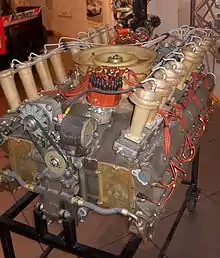
A flat-sixteen engine, also known as a horizontally opposed-sixteen, is a sixteen-cylinder piston engine with eight cylinders on each side of a central crankshaft.
Flat-sixteen engines are less common than V16 engines, with only a couple of prototype racing engines using a flat-sixteen layout.
Design
These engines had two connecting rods per crankpin, so they could also be referred to as a 180 degree V16, rather than a boxer configuration as used by most flat engines with six cylinders or less.[1][2]
Coventry Climax FWMW
The Coventry Climax FWMW was a prototype flat-sixteen engine designed between 1963 and 1965 that was intended for use in Formula One.[3] The Brabham and Lotus teams designed cars for this engine but it was never raced. This was due to reliability problems in testing and a failure to generate the desired power output.[4][5][3][6]
Porsche 917
In 1971, Porsche developed a flat-sixteen prototype engine to use in the Porsche 917 that competed in the Can-Am championship.[7] The project was abandoned and the 1972 Porsche 917/10K was instead powered by a turbocharged version of Porsche's existing flat-twelve engine.[8]
See also
References
- ↑ "Coventry Climax FWMW Engine".
- ↑ Exclusive: Porsche to run sixteen cylinder engine at Goodwood (Video). 17 July 2014. Archived from the original on 21 December 2021. Retrieved 12 December 2017.
- 1 2 "Climax flat - 16". www.motorsportmagazine.com. 7 July 2014. Retrieved 14 October 2019.
- ↑ "This Coventry Climax flat-16, 1.5-liter GP engine schematic is awesome". www.roadandtrack.com. 2 August 2013. Retrieved 14 October 2019.
- ↑ 'Sweet but unsung Sixteen', (2014). Retrieved 19 April 2017 from Motor Sport Magazine website.
- ↑ 'Climax, an engine to be proud of', (n.d.). Retrieved 19 April 2017.
- ↑ "Sweet sixteen - 16-cylinder Porsche motor". www.drive-my.com. Retrieved 14 October 2019.
- ↑ "Why The 16-Cylinder Is The Most Mythic, Tragic Engine". www.jalopnik.com. Retrieved 14 October 2019.